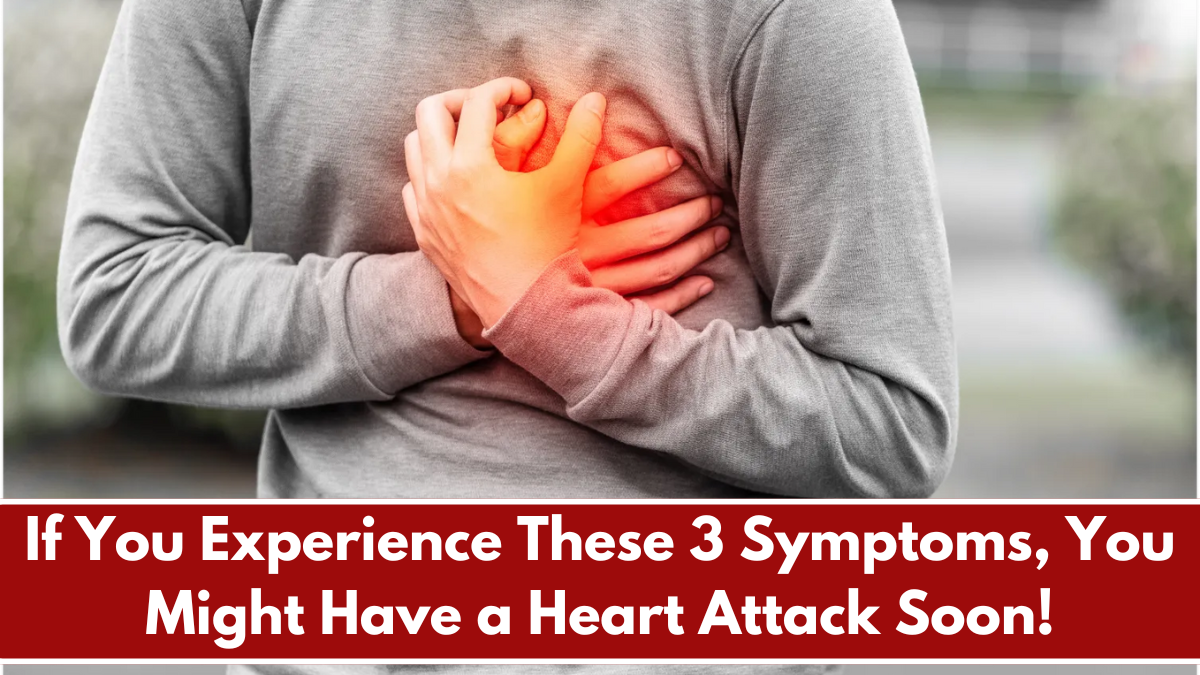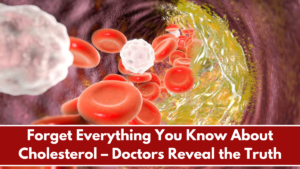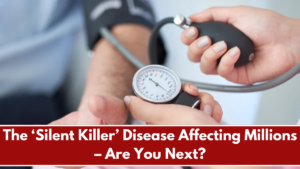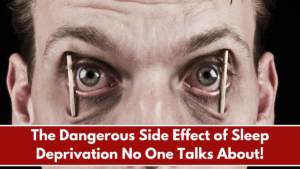Heart attacks remain one of the leading causes of death worldwide, often striking suddenly and without warning. However, in many cases, the body provides subtle yet critical warning signs before a full-blown cardiac event occurs. Unfortunately, many people fail to recognize these symptoms, dismissing them as minor discomforts or unrelated health issues. This failure to act can have life-threatening consequences.
Recognizing the early signs of a heart attack is crucial for survival. In fact, studies show that people who seek medical attention at the first warning signs of a heart attack have significantly higher survival rates and lower risks of permanent heart damage. Heart attacks occur when the blood flow to the heart is partially or completely blocked, depriving it of oxygen. Without quick intervention, heart tissue begins to die, leading to serious complications or even sudden death.
Many assume that heart attacks always begin with severe chest pain, but this isn’t always the case. In reality, many heart attacks start with milder symptoms that gradually worsen over time. Some warning signs can appear days, weeks, or even months in advance. That’s why understanding these symptoms can mean the difference between life and death.
In this article, we’ll explore three key symptoms that often appear before a heart attack, why they happen, and what you should do if you experience them. We’ll also discuss the risk factors that increase your likelihood of experiencing a heart attack and preventative steps you can take to protect your heart health.
1. Chest Discomfort or Pain (Angina)
The most well-known symptom of an impending heart attack is chest pain or discomfort, medically known as angina. While not all chest pain signals a heart attack, it is one of the most common warning signs and should never be ignored. Chest pain associated with heart problems often feels different from typical muscle strain or indigestion.
What it feels like can vary from person to person. Some describe it as a tightness, squeezing, or pressure in the chest, while others report a burning or aching sensation. The pain may come and go or persist for several minutes at a time. Some people experience discomfort only when engaging in physical activity or experiencing stress, while others feel it even at rest.
The reason chest pain occurs is because the coronary arteries, responsible for supplying blood to the heart, become narrowed or blocked due to plaque buildup. This reduces oxygen flow to the heart, triggering discomfort. If the blockage becomes severe enough, it can lead to a heart attack.
You should seek immediate medical attention if your chest pain lasts longer than a few minutes, worsens over time, or spreads to other areas of your body, such as the arms, back, neck, or jaw. Waiting too long can significantly increase the risk of irreversible heart damage or death.
2. Shortness of Breath
Feeling short of breath without any clear reason can be an early indicator of a heart problem. While many people associate breathing difficulties with lung issues like asthma or pneumonia, shortness of breath can also be a sign that the heart is struggling to pump oxygen-rich blood efficiently.
What it feels like may include difficulty breathing, gasping for air, or an unexplained tightness in the chest. You might find yourself getting out of breath even while doing simple activities like climbing stairs, walking short distances, or even just sitting still.
The underlying cause of shortness of breath before a heart attack is usually fluid buildup in the lungs, caused by a weakened heart. When the heart doesn’t pump efficiently, blood can back up into the lungs, making it harder to breathe. This is often a sign of heart failure or an impending cardiac event.
If you experience shortness of breath, particularly when it is accompanied by chest pain, dizziness, or sweating, seek emergency medical help right away. These symptoms combined can indicate that your heart is in distress, and immediate intervention is necessary.
3. Unusual Fatigue or Weakness
Extreme fatigue is an often-overlooked symptom of an impending heart attack, particularly in women. Unlike normal tiredness from lack of sleep or physical exertion, this type of fatigue feels persistent, overwhelming, and unexplained. It may develop suddenly or worsen gradually over time.
What it feels like includes feeling exhausted even after getting enough rest, struggling to complete daily activities, or experiencing weakness that worsens as the day goes on. Some people report feeling like they’ve come down with a severe illness, even though they have no fever or other flu-like symptoms.
The reason fatigue occurs before a heart attack is that the heart isn’t pumping efficiently, leading to reduced oxygen circulation throughout the body. The muscles and organs don’t receive enough oxygen-rich blood, leading to feelings of exhaustion and weakness.
If you feel persistently fatigued for no clear reason, especially if it’s paired with shortness of breath or chest discomfort, don’t ignore it. See a doctor as soon as possible to rule out underlying heart conditions.
Other Symptoms to Watch For
While the three symptoms above are the most critical warning signs of an impending heart attack, other signs may also indicate trouble. These include:
- Pain or discomfort in the jaw, neck, or arms – Often occurs alongside chest pain but can sometimes be the only symptom.
- Cold sweats and dizziness – Can indicate poor circulation and oxygen deprivation.
- Nausea, vomiting, or indigestion – More common in women, often mistaken for a digestive issue.
- Irregular heartbeat or palpitations – A racing, fluttering, or unusually slow heartbeat may signal heart distress.
What to Do If You Experience These Symptoms
If you notice any of these warning signs, you must act quickly. Taking immediate action can prevent a full-blown heart attack and potentially save your life.
Call 911 immediately if you experience chest discomfort, shortness of breath, or unusual fatigue, especially if these symptoms persist or worsen. Do not attempt to drive yourself to the hospital, as a heart attack can escalate rapidly. If recommended by your doctor, chew an aspirin while waiting for medical help. Aspirin can help thin the blood and improve circulation, reducing the severity of a heart attack. While waiting for emergency responders, rest in a comfortable position and avoid any physical exertion. Try to stay as calm as possible, as stress and anxiety can make heart symptoms worse.
Conclusion
A heart attack is rarely a sudden event without warning. In most cases, the body sends distress signals in the form of chest discomfort, shortness of breath, and extreme fatigue. These warning signs may appear days, weeks, or even months before a heart attack strikes. Recognizing them and seeking medical help early can prevent a life-threatening event and increase your chances of survival.
Understanding your personal risk factors, such as high blood pressure, diabetes, obesity, smoking, and high cholesterol, can also help you take preventive measures. Regular check-ups, a heart-healthy diet, regular exercise, and stress management can all reduce your risk of heart disease and improve your overall cardiovascular health.
FAQ’s:
1. What are the earliest warning signs of a heart attack?
The earliest warning signs of a heart attack are often subtle and can appear days or even weeks before the actual event. These signs may include chest discomfort, shortness of breath, unexplained fatigue, jaw pain, nausea, and dizziness. Unlike sudden heart attacks depicted in movies, many heart attacks develop gradually, beginning with mild symptoms that worsen over time. Some people experience discomfort that comes and goes, which is why they dismiss it as something minor. Recognizing these early symptoms and seeking medical attention immediately can help prevent a full-blown heart attack.
2. How do I know if my chest pain is heart-related or just indigestion?
Chest pain caused by a heart attack or heart disease often feels like pressure, tightness, squeezing, or burning in the center or left side of the chest. It may radiate to the arms, neck, jaw, or back. Unlike indigestion, which usually occurs after eating and is relieved by antacids, heart-related chest pain may worsen with physical activity and improve with rest. If your chest pain is accompanied by shortness of breath, cold sweats, dizziness, or nausea, seek medical help immediately. If you are unsure whether your chest pain is heart-related or not, it’s always safer to get checked by a doctor.
3. Can women experience different heart attack symptoms than men?
Yes, women often experience different and less obvious heart attack symptoms compared to men. While chest pain is still common, women are more likely to experience unusual fatigue, shortness of breath, nausea, vomiting, lightheadedness, and pain in the jaw, neck, or upper back. Because these symptoms can be mistaken for anxiety, indigestion, or the flu, many women ignore them until it’s too late. This is why heart disease is sometimes called the “silent killer” in women. Women should pay close attention to their bodies and seek medical attention if they feel something is off.
4. Can a heart attack happen without chest pain?
Yes, some heart attacks occur without any chest pain, especially in women, older adults, and people with diabetes. These are known as “silent” heart attacks, and their symptoms may include fatigue, shortness of breath, nausea, cold sweats, or discomfort in areas like the jaw, arms, or back. Because these signs can be vague, many people don’t realize they’ve had a heart attack until they go for a medical check-up. Silent heart attacks can still cause significant damage to the heart and increase the risk of future cardiac events. That’s why recognizing any unusual symptoms and getting checked by a doctor is essential.
5. Why does shortness of breath occur before a heart attack?
Shortness of breath before a heart attack occurs because the heart struggles to pump blood effectively, leading to fluid buildup in the lungs. This makes it harder for the lungs to function properly, causing difficulty breathing. Some people feel out of breath even when doing simple activities, like climbing stairs or walking short distances. Others may wake up in the middle of the night gasping for air. If you experience unexplained shortness of breath, especially with chest discomfort or fatigue, it could be a warning sign of a heart problem and should be evaluated immediately.
6. What should I do if I think I’m having a heart attack?
If you suspect you’re having a heart attack, call 911 immediately. Do not try to drive yourself to the hospital, as your condition could worsen rapidly. While waiting for emergency help, you can chew a regular aspirin (if you are not allergic) to help thin the blood and reduce clot formation. Try to stay as calm as possible and avoid any physical activity. If someone near you is having a heart attack, encourage them to stay seated, call emergency services, and be prepared to perform CPR if they lose consciousness. Fast action can make a life-or-death difference.
7. What are the biggest risk factors for heart attacks?
The most common risk factors for heart attacks include high blood pressure, high cholesterol, diabetes, obesity, smoking, a sedentary lifestyle, excessive stress, and a family history of heart disease. Poor diet choices, excessive alcohol consumption, and chronic sleep deprivation can also increase the risk. While some risk factors, like family history, cannot be changed, lifestyle modifications such as regular exercise, a healthy diet, stress management, and quitting smoking can significantly reduce your chances of experiencing a heart attack.
8. How can I prevent a heart attack?
Preventing a heart attack involves making heart-healthy lifestyle changes, such as eating a balanced diet rich in fruits, vegetables, whole grains, and lean proteins, engaging in regular physical activity, and maintaining a healthy weight. It’s also important to control risk factors like high blood pressure, high cholesterol, and diabetes by following your doctor’s recommendations. Managing stress, getting enough sleep, and avoiding smoking or excessive alcohol can further protect your heart. Regular check-ups with your doctor can help detect potential heart problems early, before they become life-threatening.
9. Are heart attack symptoms different at night?
Heart attack symptoms at night can feel similar to those experienced during the day, but they may be mistaken for other conditions, such as acid reflux, anxiety, or a bad dream. Many people experience chest discomfort, shortness of breath, night sweats, or sudden fatigue while sleeping. Sometimes, people wake up gasping for air due to fluid buildup in the lungs, a condition known as paroxysmal nocturnal dyspnea (PND). If you frequently experience chest pain, difficulty breathing, or irregular heartbeats at night, it may be a sign of an underlying heart condition and should be discussed with your doctor.
10. What is the survival rate for a heart attack if treated immediately?
The survival rate for a heart attack depends on how quickly medical help is received. If treatment is given within the first hour of symptoms (known as the “golden hour”), the chances of survival and recovery are significantly higher. Modern treatments like clot-busting medications, angioplasty, and stents have improved survival rates dramatically. However, the longer a person waits to seek help, the greater the risk of severe heart damage or death. Around 90% of people who receive immediate medical attention for a heart attack survive, but delays in seeking help reduce survival chances. This is why recognizing early symptoms and acting fast is crucial.



